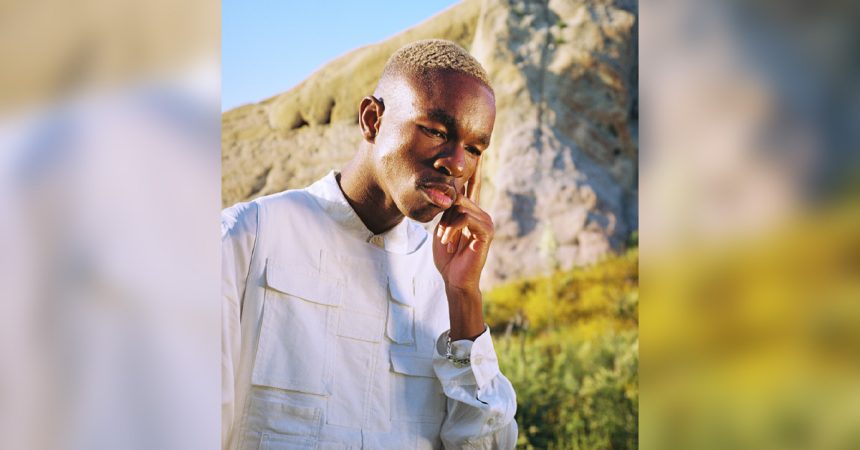Sam Austins appears in our Fall 2023 Issue with cover stars Scowl, Yves Tumor, Poppy, and Good Charlotte. Head to the AP Shop to grab a copy.
Sam Austins’ joy is like the sun — inexhaustible, blinding, hypnotic. It feeds into the way he describes his own music, and the work of others. His songs match his energy, conjuring the scope of a crate-digger who’s become increasingly unmoored by categorization. He finds kinship in the experimentalism of Yves Tumor, the breadth of Pink Siifu, and the larger-than-life strut of Prince, but he doesn’t sound like those artists. He doesn’t sound like anyone, really.
Austins’ songs are all his own, synthesizing his founts of musical knowledge into a mesmerizing number of styles. Sometimes a new way forward simply spawns from imitating his favorite artists, like Radiohead. “I’m always trying to figure out how to incorporate my love for them into my world, and I always fail, which is the success of it,” he gushes from his home in LA, thousands of miles away from his native Detroit. “You end up trying to do these things, and then you end up doing something so completely different that has these colors that you pull from, but they’re not the same.” On his latest project, the BOY TOY EP, he pushes that sentiment to the brink as the songs dart from buoyant, indie-pop bursts (“Matador”) to couch-locked slow burns (“Oatmeal Pancakes”).
Read more: 15 greatest supergroups across rock, punk, and metal
To add another perspective to his own experiences, Austins dreamed up a character to live alongside its five songs. Behold Samuel Salem Bonhart, a broken-hearted eccentric who’s become so warped by vanity, he’s lost himself. Picture a “crazy ’80s glam Prince/Rick James ripoff” whose journey is fleeting and demise is grim: He’s turned into a cake and eaten by the end of the “Sweet Tooth” music video. If anything, Austins’ imagination is an ever-expanding universe that isn’t limited to one good idea. There’s so much more to come as he takes flight — perhaps even another alter ego down the line. “Maybe this will be the multiverse of Sam Austins,” he laughs.
What kind of music did your family put you onto when you were growing up?
My dad was in a Motown group called Four Tops. He would tour with them pretty often, and he had this record collection of Sam Cooke, Jim Croce, all these different singer-songwriters from the ’60s and the ’50s that he grew up on. Then obviously Michael Jackson was our shared family dynamic. Michael Jackson was where I was really inspired by the idea of what a pop star and an entertainer could be onstage as someone who makes these larger-than-life music videos.
Then when you get older, you fall in love with other things. I fell in love with hip-hop, like 50 Cent, Eminem, Kanye, a lot of the East Coast and Midwest hip-hop. Then once you turn 10-11, you discover Guitar Hero and Rock Band, and then you start finding Paramore and My Chemical Romance. “Helena” becomes your theme song of life. From there, when I was 15, I would find music way earlier than everybody. I’d be digging through all the blogs and all the illegal websites finding artists like Odd Future mad early, old Kanye leaks, and a lot of new hip-hop and R&B, like the Weeknd. It was so much of things that were just funneled through my family and the internet, in every source, in every way, and I think that it made a really complicated individual in me.
Your music really leans into this unclassifiable category where it’s a lot of different things. How would you describe it to an Uber driver?
I try and do that all the time, and I fail miserably. I think that every time I have to section it by what I’m making at the moment. On the most basic level, I just tell people I make alternative/indie music. No one will ever understand me from just saying that, but I think you have to go find out [and] make your own description of it because I don’t play by that many boundaries.
I pull a lot from hip-hop. I pull out from electronic. I pull out from alternative, indie, the Strokes, Prince, D’Angelo. So many different things have come together in my head to be able to make the music that we put out. You have to listen to it yourself and find your connection to it in your own way and what you feel. I think that’s the magic of it. It’s not meant to be classified — it’s just meant to be experienced.
Madlib has Quasimoto, whereas George Clinton has Dr. Funkenstein and Starchild. Can you tell me about your alter ego?
Oh, my God, I find Salem B to be a perfect representation of the ego unchecked. I almost liken him to my father because my dad was a bit of a chaotic person in a way that his ego spiraled him out in a lot of situations. I wanted to take the opportunity to make a character in this humorous tone of someone who is just so lost in their glam, in their ego, in their psyche that they don’t realize the damage that they do to others or the damage they do to themselves.
You can find your own meaning in it and your own place within it, but it was really fun, and I had no idea what I was doing when I first started to make this character. It was very much a string of thoughts of, “What does BOY TOY mean?” I didn’t realize until after I finished the project what the EP had meant to me. All these things were just growing in real time. It’s a very crazy thing to make an alter ego, and I’m probably less sane for doing it. [Laughs.]
Have you found that there’s a sleeper hit of BOY TOY so far?
Although “Oatmeal Pancakes” was my favorite song when we had finished the whole EP at the time, [it also] was a lot of my peers’ favorite song. I remember playing it for my friend Vagabon, who’s also an amazing artist, and she was telling me, “This is my favorite song of yours that you’ve ever written.” I don’t know any song that sounds like it — it pulls a lot from a lot of different places. It ends up going into this psychedelic second half that rips a little bit from BADBADNOTGOOD. I think it’s all still finding its home. As I’m writing new music, I feel like this BOY TOY EP will just live and grow more and more into its own thing, and people will find things that they love about it over time.
“Oatmeal Pancakes” is my favorite song, too. With that ending part, are you jamming, or is that a loop?
We made the first half of the song a while back ago, and we were tweaking it. We had this structure of the song where it goes back to the chorus again, and it didn’t feel right going back to that every time. It felt like it dropped back in energy because the chorus is like an anti-chorus in a way that it feels like a pre-chorus. So it doesn’t really feel like this big, explosive hook. We were trying all these different ways we could approach it.
One day [Kaleb David Waterman] came over. He had plugged up the guitar and found this really sweet-spot melody. I loved it. Then I found a sweet-spot melody that I top-lined over, and it felt really sexy and seductive. Then Kaleb exploded into the other progression of the guitar, and I was like, “We need to find a drummer.” So I hit up Sam KS [Miya Folick, Youth Lagoon]. It was all segmented in the way that it was recorded. Sam just added the craziest tune. It sounds so perfect.
Now that the EP is out, what’s left on your bucket list this year?
Go watch more amazing shows, be a part of more amazing shows, write more amazing music, come up with what an album will sound like. I’ve never put out an album yet, so this is my new task right now. I don’t know if it’s one of those things that I would say is a bucket list to finish this year, but it’s definitely a bucket list to find out where we’re going.









